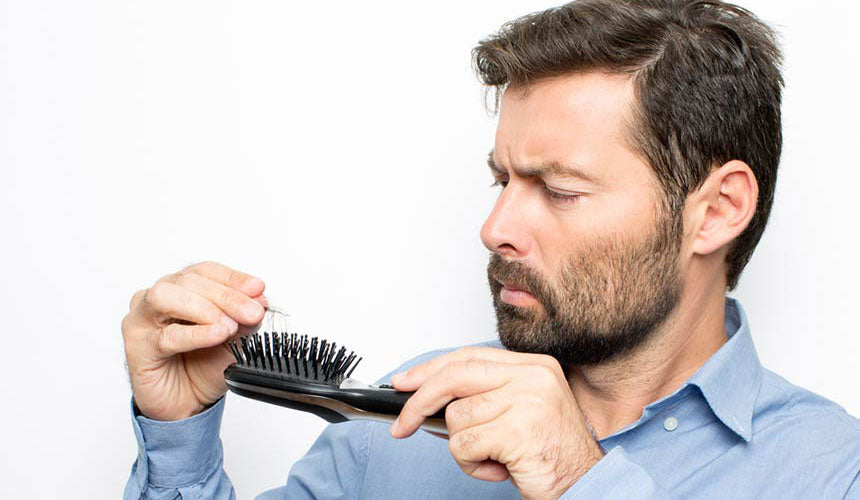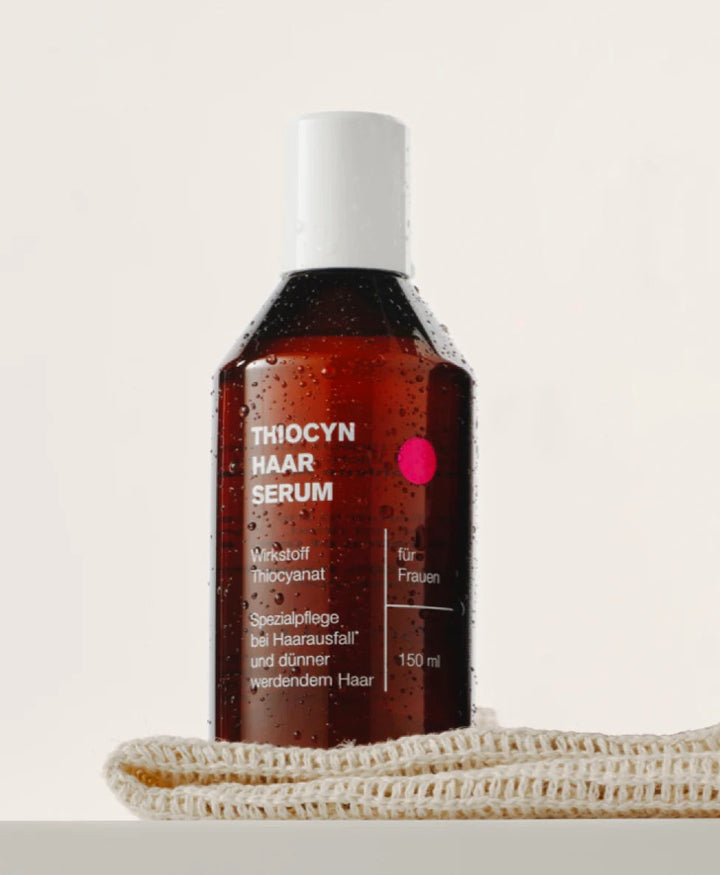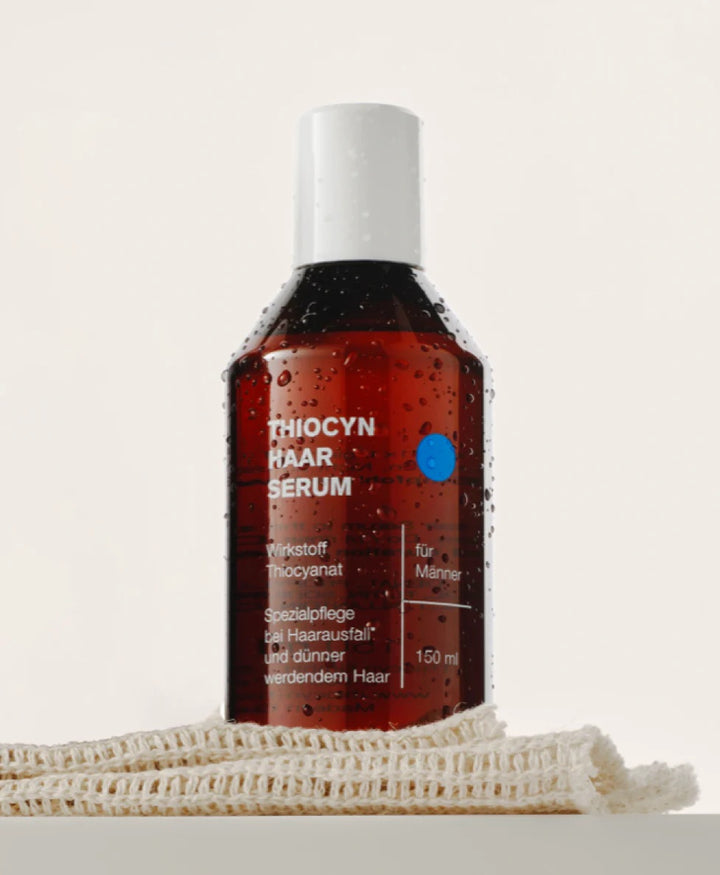| 04. July 2023
Hair loss causes

What are the reasons for my hair loss?
- Causes of hair loss include genetic predisposition, hormonal changes, unbalanced diet, diseases, side effects of medication, stress or autoimmune reactions.
- Dermatologists detect excessive hair loss by counting the hairs in the growth phase (anagen) and resting phase (telogen).
- If the proportion of telogen hair is over 20%, this indicates increased hair loss.
- Diagnosis is made more difficult when hair loss is caused by two or more different causes.
- A good remedy for hair loss* should be very well tolerated and effective.
Dermatologists can accurately determine the type of hair loss with a trained eye on the head and scalp. Typical for men are the receding hairline and tonsure caused by hereditary hair loss. Women are often affected by diffuse hair loss across the entire head. Hair loss Alopecia areata, or alopecia areata, causes bald patches in the middle of the hair in both women and men. But what are the causes of my hair loss?
1. Hereditary hair loss
Hereditary hair loss Androgenetic alopecia, or androgenetic alopecia, is the most common form of hair loss. The most common cause is genetic misprogramming of the hair follicles. Misprogramming means that the hair follicles react sensitively to the androgen dihydrotestosterone, abbreviated DHT. DHT impairs the hair's cellular metabolism. The permanent disruption of cellular metabolism at the hair roots leads to hair loss.
In men, hair loss exposes certain parts of the head. Parallel to the receding hairline and the formation of a receding hairline, the hair thins in the crown region. As the bald patches merge, men develop a bald head over the years. In women, it usually occurs with the onset of menopause and around menopause, hair loss occurs due to an imbalance in hormone levels. The hair density of affected women decreases noticeably in the parting area.
2. No clear causes of hair loss: alopecia areata
Alopecia areata, technical term Alopecia areata can literally appear overnight. Short, broken hairs are found along the edges of the circular, hairless areas of skin, tapering toward the scalp. The bald patches are smooth, non-flaky, and have intact hair follicles. Alopecia areata is less common than hereditary hair loss and occurs more frequently in women, children, and adolescents.
The cause of alopecia areata appears to be inflammation of the hair roots as a result of an attack by the body's own immune system. Certain immune cells "paralyze" the cells' metabolism and thus hair growth. Typically, hair loss occurs very suddenly. Often, the hair follicles recover without treatment, so that the hair grows back on its own after a certain period of time. However, alopecia areata cannot be cured. This type of hair loss can recur.

3. Various causes: diffuse hair loss
Diffuse hair loss affects the entire head of hair. The hair becomes thinner and sparser (less dense), and often bald patches appear. However, diffuse hair loss does not lead to baldness.The possible causes are varied:
Hormonal imbalances
Severe hair loss (more than 100 hairs per day) can be caused by hormonal imbalances caused by: when stopping the contraceptive pill or after pregnancy, when less estrogen circulates in the body.
Iron deficiency
Women are particularly affected by hair loss due to iron deficiency. A blood test provides reliable data on the levels of trace elements relevant for hair growth, such as iron, but also zinc and selenium.
Diseases
Sudden hair loss can be one of the symptoms of an underactive thyroid or diabetes mellitus. All disorders that negatively impact metabolic cycles often also affect the cellular metabolism of hair follicles.
Cytotoxic drugs
Cytotoxic drugs are primarily used in cancer chemotherapy, where they are intended to inhibit the growth of cancer cells. At the same time, they impair cell metabolism at the hair roots, causing both hair loss and hair breakage. If there is no significant damage to the hair roots, the hair will grow back after chemotherapy.
stress
Stress caused by excessive mental and physical strain presumably leads to a buildup of neurotransmitters such as noradrenaline at the hair roots. The hair follicles interrupt the growth phase of their hair prematurely, resulting in hair loss. best method to avoid hair loss caused by stress factors is to avoid stress. (Which is usually easier said than done.)
Medications
In principle, medications can also trigger diffuse hair loss. The mechanisms are still unclear in detail. However, they can generally be described as Changes in certain metabolic processes caused by the active ingredients of the medication understand. The ability of the hair follicles to produce hair is weakened. If the medication is discontinued or replaced with medications from other substance classes, a new hair cycle usually begins.
Crohn's disease
The chronic inflammatory bowel disease Crohn's disease prevents the dividing hair root cells from receiving nutrients (protein, carbohydrates, fat), vitamins, and trace elements. Where there are no nutrients, there is no hair growth.
Nutrition
Hair loss also occurs in conjunction with malnutrition, particularly in cases of starvation, bulimia, or anorexia. All processes that impair the body's functionality and health often also affect the hair follicles and the overall condition of the hair.
A balanced diet is the basis for healthy hair growth. The German Nutrition Society makes 10 suggestions.
Hair loss causes: Conclusion
The causes of hair loss and ultimately hair thinning are individual and diverse: genetic predisposition, autoimmune deficiencies, metabolic disorders, and organic dysfunctions. Men are more prone to androgenetic alopecia. Women are more affected by diffuse hair loss. The most important finding: Hair is not diseased and cannot become diseased because it consists of inanimate horny cells (keratins). It is the highly sensitive hair-forming hair follicles that react to certain influences by ceasing hair production. The result is hair loss.
Psychological consequences of hair loss
For most people, hair is part of their identity, a sign of attractiveness, health, and physical integrity. Excessive hair loss can negatively impact self-image and, often, psycheMen cope better with hair loss overall due to social acceptance. Equipped with healthy self-confidence and increasing age, they think: I'm not sick or disfigured, I just have less hair than others. For many women, hair loss and the threat of hair loss are an ever-present risk. Women suffer from hair loss more than men and are constantly searching for an active ingredient that can reduce hair loss or promote hair growth.
Therapy to reduce hair loss
Due to their specific mechanisms of action, medications for hair loss usually only work in one direction and for a specific indication. However, it is often not possible to determine the exact cause of hair loss. Therefore, the search is on for a medication that can help with many types of hair loss* because it doesn't combat the disorders but compensates for them by promoting cellular metabolism at the hair roots.
Unlike a pharmaceutical active ingredient, Thiocyn Hair Serum works non-specifically. The patented thiocyanate formula activates and strengthens the hair roots, making them less susceptible to influences that disrupt or inhibit hair growth.
Multi-talented thiocyanate
Thiocyanate is a flexible, endogenous molecule: It has a positive influence on essential enzyme activities, the regulation of microflora, cell membrane activity, and transport processes of endogenous molecules. Thiocyanate has been an essential component of cellular metabolism since the beginning of biological evolution. As the most important component of the patented thiocyanate active formula, Thiocyn Hair Serum helps prevent thinning or thinning hair and slows hair loss* to actively combat.
Questions for our service team
What causes hair loss in women after pregnancy?
During pregnancy, the female body produces an above-average amount of estrogen to promote the growth of the child. This estrogen surge also stimulates cell metabolism in the hair roots, prolonging the growth phase of many hairs. If estrogen levels drop after birth, the artificially prolonged growth of many hairs stops. More hair falls out. Usually, this hair loss and thinning after pregnancy is only a temporary effect.
What role do scalp diseases play in hair loss?
Hair loss can occur as a side effect of scalp diseases or inflammation. To stop hair loss and prevent scarring alopecia, medical treatment by a doctor or dermatologist is strongly recommended.
What is the cause of my “coat change”?
Seasonal shedding, or more accurately, fall hair loss, manifests as periodic, diffuse hair loss. The cause is a specific genetic programming of the hair follicles, which react to light or UV radiation during the summer months. A particularly large number of hair follicles transition from the growth phase to the resting phase in the fall. Their hair then remains more or less loosely attached to the scalp for a few weeks and falls out naturally, through brushing, or washing.
Does hair loss always mean hair loss?
If the hair follicles are intact and cell metabolism is not disrupted, hair will continue to grow back. However, before new hair sprouts, the hair follicles always enter a resting phase. Temporary hairlessness is not hair loss.
Which medical treatment for hair loss is best?
Hereditary hair loss, for example, can rarely be treated successfully because its cause cannot be eliminated, namely certain hair follicles that are sensitive to DHT.
Diffuse hair loss, on the other hand, is generally reversible if its underlying causes are eliminated. Since stress, feverish infections, or short-term hormonal imbalances are often temporary causes of hair loss, initiating medical treatment hardly makes sense. In any case, it is recommended to strengthen the hair roots of regrowing hair, for example, with the patented thiocyanate active formula in Thiocyn Hair Serum.
Is hair transplantation a suitable treatment?
A hair transplant doesn't cure hair loss either. However, it does boost self-confidence because the hair loss is less noticeable, or even invisible.
Does washing your hair daily cause hair loss?
Typically, diffuse hair loss becomes noticeable three months after the growth disorder. The hair is only loosely attached to the hair follicle and is detached from the scalp by mechanical stimuli such as styling, brushing, or washing. However, these activities are not the cause of hair loss.
Read by 23,000 people
Do it like 23,000 others and find out how you can improve your hair health - with great offers and discounts as well as helpful advice











